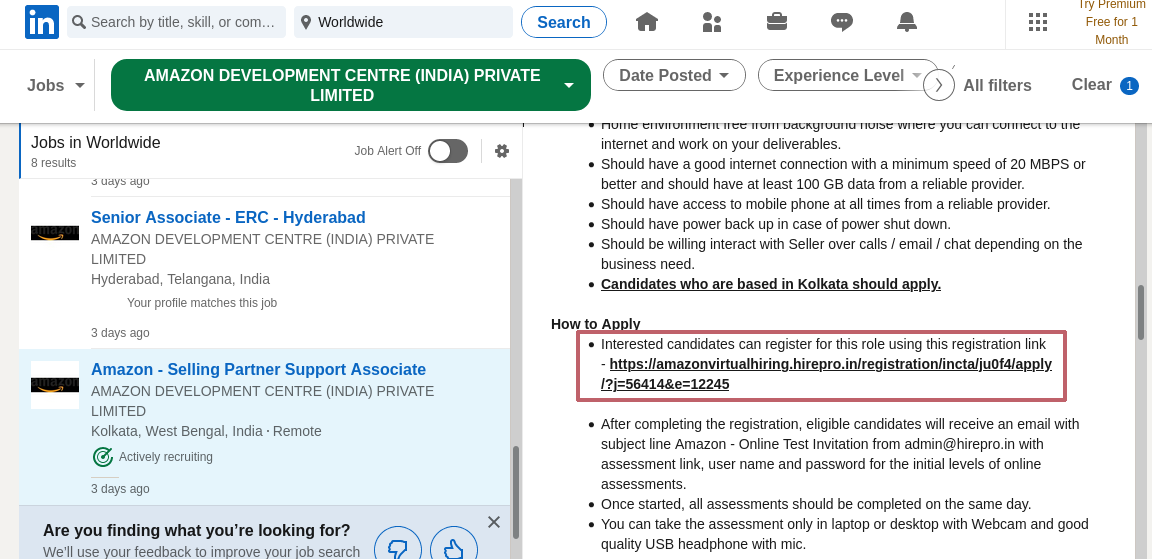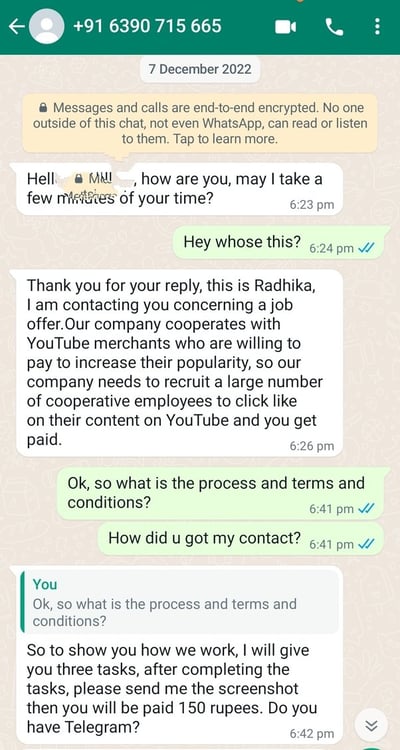
By
Tomás Battaglia
August 24, 2023
Updated
November 20, 2024
The rise of technology has opened up a whole new world of work-from-home opportunities. Swapping the daily commute for the comforts of home, trading stiff office attire for pyjamas, and finding a work-life balance that truly benefits our mental well-being—it all sounds idyllic.
A Qualtrics research even showed that 35% of the workforce would leave their positions if full-office regimens were to be implemented again. Yet, as with any paradigm shift, this transition hasn't been without its pitfalls.
This transition has also given recruitment scammers a platform to exploit individuals seeking remote employment. With the increasing number of work-from-home job scams, it's essential to stay informed and be able to distinguish between legitimate opportunities and fraudulent schemes.
In this article, we will cover everything about work-from-home scams and how to spot and avoid them:
- The nature of job scams
- Five common work-from-home scams
- How to protect yourself from scams
- What should I do if I've been scammed
- Find authentic jobs with Airswift
- Notice to all potential employees
The nature of job scams
In the vast digital landscape of the 21st century, the lines between legitimate opportunities and well-crafted deceit can be blurred. To navigate this terrain safely, it's essential to recognise the various forms that remote work scams can take.
The online world, vast and often unregulated, offers scammers a playground. While the internet connects us, it also provides anonymity, making it easier for deceitful individuals to mask their true intentions. These scams have found a perfect breeding ground in the remote work sphere, where interactions are often without in-person, face-to-face verification.
In fact, according to the American Trade Commission, Americans were scammed out of $68 million in the first four months of 2022 due to fake opportunities and job listings.
In this blog, we will cover the most common work-from-home scams, how to protect yourself from recruitment scams and what to do if you’ve been scammed.
Five common work-from-home scams to look out for
Fake job listings
This is perhaps the most prevalent recruitment scam. Scammers craft compelling job adverts to lure in hopeful job-seekers, often mirroring real companies. They're commonly found on reputable job boards, making them even trickier to spot.
In addition to the usual fake listings on job boards, scammers have started to use more sophisticated platforms like LinkedIn, creating fake company profiles or even hacking into legitimate ones.
They may also post jobs in community forums or Facebook groups dedicated to job seekers. Scammers are now mimicking applicant tracking systems and sending 'job offer' emails that appear to come from reputable companies, complete with official logos and even anti-discrimination disclaimers.
These listings often ask for payment upfront for scheduling a meeting, only to disappear once they've received your money.
 Source: https://www.linkedin.com/pulse/read-before-you-go-your-first-amazon-application-from-apan-trikha/
Source: https://www.linkedin.com/pulse/read-before-you-go-your-first-amazon-application-from-apan-trikha/
Payment for training or materials
Here, the scammer might acknowledge that you've "secured" the role but will request a fee for essential training or tools. Scammers are getting craftier here by not just asking for money for supposed training but also for 'certifications' that are totally unnecessary or irrelevant.
Some job scams go as far as creating bogus online courses with testimonials to lend an air of legitimacy. Others might ask for payment to 'secure your place' in a popular company or for exclusive 'pre-interview coaching sessions' guaranteed to land you the job. They'll argue it's a small price for the lucrative opportunity ahead. Yet, once paid, they vanish, and you're left out of pocket with no job in sight.

Unsolicited job offers
Received an email or a message offering a job you didn't apply for, especially one that promises an attractive salary for minimal work? It's probably too good to be true. Scammers are now using AI and machine learning to scrape resumes or profiles from job sites, tailoring their unsolicited job offers to make them more appealing and convincing.

The goal is to make you feel special as if you've been headhunted for a role you're perfectly suited for. They may even claim to have an 'urgent need' for someone with your specific skills, adding a sense of urgency to trick you into acting quickly without thoroughly vetting the offer. Recruitment scammers exploit our aspirations, hoping we'll overlook the details in excitement.
"Get paid to" job scams
"Get paid to", or GPT scams have proliferated, luring individuals with the promise of easy money for seemingly simple tasks like answering surveys or watching videos. These types of recruitment scams often entice users with the allure of disproportionately high payouts, sometimes even asking for an upfront "membership fee" for access to these lucrative opportunities.

As participants invest time and sometimes money into completing tasks, they may find themselves unable to withdraw their purported earnings due to unreasonably high withdrawal thresholds. Even worse, the platforms may be more interested in harvesting sensitive personal data, putting participants at risk of identity theft or fraud. Always exercise caution and conduct thorough research before committing to such schemes.
How to protect yourself from work-from-home scams?
Navigating the digital landscape of remote work is similar to sailing uncharted waters: Being well-prepared for the journey is crucial.
Before making any commitments, take the time to research potential employers thoroughly. Looking into their official websites, examining the LinkedIn profiles of their team members, and scouring any external mentions in news articles or industry publications can offer valuable insights.
While platforms such as LinkedIn, Glassdoor, and Indeed can't guarantee a scam-free experience, their stringent measures provide an added layer of safety. Relying on such platforms can be a practical first step, but one should always couple this with personal diligence. For instance, avoiding sharing personal or sensitive information is always prudent unless you're entirely confident in the employer's legitimacy.
Remember, in the world of remote work, communication is key. If any aspect of a job offer raises eyebrows, voice your concerns. Genuine employers value transparency and will be more than willing to address any queries. Moreover, connecting with current or former employees can paint a clearer picture of the company's ethos and work environment.
On the technical front, be cautious with downloads. A seemingly innocent software tool could be malware's trojan horse, so it's always worth ensuring that any download is from a trustworthy source. Additionally, ensuring that the websites you frequent are secure, indicated by an 'https' prefix and a padlock symbol, can safeguard your data.
Finally, remember that the online community thrives on shared knowledge. If you ever stumble upon or suspect a scam, take the initiative to report it. This not only safeguards others but also strengthens the integrity of the remote work community.
By adopting a vigilant yet optimistic approach, we can ensure that our remote work journeys are secure.
What should I do if I've been scammed?
Discovering you might be dealing with a fraudulent entity or that you may have been ensnared in a deceptive scheme can be anxiety-inducing and sometimes compel you to make rash decisions. However, equipped with the right knowledge, you can take measures to curtail any further risks.
Here is what you can do if you believe you have fallen victim to a scammer:
Cease communication with the scammer
The first line of defence is to immediately sever all ties. If your instincts are signalling that you're in dialogue with a scammer, halt all communication at once. While doing so, it's crucial to maintain a repository of all prior interactions – from emails and messages to phone numbers. This documentation can be invaluable for potential investigations or alert others about the trap.
Change your passwords and keep an eye on your bank accounts
In the digital age, our personal and financial data are often interlinked. If there's even the slightest apprehension that your login credentials or other personal data have been exposed, act swiftly to change passwords across platforms. Simultaneously, a vigilant eye on your bank and credit card statements can help spot and report any aberrant transactions should you have divulged any financial details.
Report the scammer to the relevant authorities
The digital realm is vast, and information travels at the speed of light. Use this to your advantage. Reporting the suspected scam to dedicated agencies can aid in curbing such malevolent activities, and alerting your personal and professional network can act as a preventive measure, safeguarding those you know from similar pitfalls.
In certain circumstances with severe consequences, seeking legal counsel might be a prudent course of action. This can help delineate the nuances of the situation and any possible legal recourse.
Above all, it's imperative to remember that scams are an unfortunate reality of the digital age. Their prevalence does not reflect an individual's acumen but rather the persistent and evolving nature of cyber threats.
Find authentic jobs with Airswift
Airswift has been in the recruitment business for more than 40 years, helping people find roles they love in the engineering and technology industries. We understand what job seekers want and use our knowledge to connect them with opportunities that fit their skills and goals.
With our extensive network of recruiters spanning across various countries, we have a global reach that enables us to stay informed about job opportunities worldwide. This allows us to connect candidates with the perfect positions aligning with their skills and ambitions.
In order to maintain trust and ensure your safety during your job search, it's important to be cautious of imposters claiming to be from Airswift. Remember, our genuine recruiters will always use an 'Airswift.com' email address, and you can also verify their authenticity by checking their profiles on LinkedIn.
Trust is our core value, and we prioritise your peace of mind throughout your job-hunting journey.
Looking for your next role? We're here to help. Check out our job board to see current openings from trusted employers all over the world.
Notice to all potential employees
Airswift wants to alert you to fraudulent activities that have come to our attention, specifically involving an individual named Simon Gerlach. This person has falsely claimed to be associated with our organization. We want to make it clear that Simon Gerlach has no affiliation with Airswift and is not an employee or affiliate in any capacity.
For your safety, we strongly recommend being vigilant and confirming the legitimacy of anyone purporting to represent Airswift. Authentic correspondence from our end will solely originate from official email domains. Furthermore, it's important to note that we will never ask for payment during any stage of the recruitment process, be it application, interview scheduling, or CV registration.
Thank you for your understanding and continued support.
